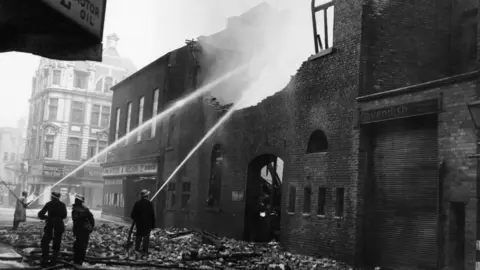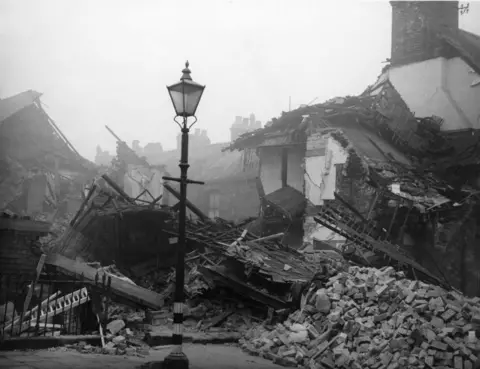MP: Why has Hull Blitz report never been released?
 Mirrorpix/Getty Images
Mirrorpix/Getty ImagesAn MP has called for a report into the impact of the World War Two bombing of Hull to be made public after 83 years.
Dame Diana Johnson has written to the National Archives to ask why the paper – which was written in 1942 but never released – was given an indefinite embargo in 2020.
More than 400 people were killed during air raids in Hull in May 1941. In total, about 1,200 civilians died and 95% of homes in Hull suffered damage during the course of the war.
The BBC has contacted the National Archives for comment.
The paper, titled Quantative Study of Total Effects of Air Raids (Hull and Birmingham Survey), was written by Solly Zuckerman and J D Bernal, who were government scientific advisors.
Dame Diana said Hull had suffered a casualty rate on a par with that seen in London during the Blitz, but many people felt the city's wartime role had been "overlooked and undervalued".
Publishing the report would help "set the record straight" and give Hull "the recognition the city merits".
She wrote: "The information contained in this report is of great importance to historians, researchers and the wider public.
"Hull's wartime story has been largely overlooked, obscured and ignored in national public life.
"This has fuelled the sense of Hull being the 'forgotten city'. Other towns and cities do not seem to have been treated in this way."
 Mirrorpix/Getty Images
Mirrorpix/Getty ImagesThe Labour MP for Hull North and Cottingham pointed to the "painful irony" of locations in the city standing in for London when filming took place for Steve McQueen's movie Blitz.
She added: "It is noticeable that areas of East London's Docklands that were bombed so heavily in the Blitz have seen transformative levels of investment in economic and infrastructural regeneration over the past five decades.
"The same is not true of Hull."
The MP said she had been told that preliminary drafts of the report were housed in an archive at the University of East Anglia, but the final version had never been published.
The National Archives is the official archive of the UK government and for England and Wales and looks after some of the nation's most important documents which date back more than 1,000 years.
Listen to highlights from Hull and East Yorkshire on BBC Sounds, watch the latest episode of Look North or tell us about a story you think we should be covering here.
